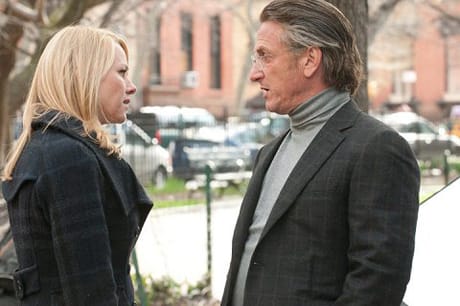Near the beginning of this biopic about exposed CIA operative Valerie Plame (Naomi Watts) and husband Joseph Wilson (Sean Penn) — whose 2003 New York Times op-ed piece "outed" her — the couple host a dinner party. With the post-9/11 climate dominating consciousness, a guest elaborates on his likely reaction should two Middle Eastern men, sweating and praying, sit next to him on a plane. Sean Penn sighs, rolls his eyes and reacts much as one might expect if this were real life.
Fair Game then gives us — the audience — some context, following Valerie on a couple of missions and detailing CIA discussions about possible nuclear weapons in Iraq. Joseph runs off to Niger to find out if any uranium has recently been traded or transported, concluding confidently that it has not, quashing the impetus behind a possible Iraq invasion. Cue some conjecture and Republican vilification and a war is a brewing, with a pissed off Sean Penn bitching about justice.
We're then treated to another dinner party scene, wherein we know about government conspiracy when a dinner guest goes into a similar rant about racial profiling, leaving the audience — now manipulated into an opinion — cheering on Penn when he preens self-righteously. Anyone that isn't keen on being told how to think and feel might feel violated by such a heavy-handed narrative tactic. I know I did. I felt even dirtier when Penn scoffed at someone, correcting their pronunciation of Niger (Knee-gere), in a bid to show how informed and Liberal he is.
Rounding out the film is Doug Liman's unnecessarily grating handheld camerawork, a blanched-out aesthetic and a series of political rants juxtaposed with Naomi Watts's suffering after being fired from the CIA and made a mockery of in the media. It takes about an hour to get to its point, but once it does there's little else going on other than Penn's constant yelling and preaching, culminating in a prosaic, obnoxious speech appropriately delivered to a bunch of idealistic undergraduates.
No doubt, Naomi Watts makes the film watchable, almost likable, with her portrayal of a strong woman pushed to her limits, but the adjacent political pedagogy and vulgarity of Penn's loudmouth character sully this bit of good with demeaning, trendy bias.
(eOne)Fair Game then gives us — the audience — some context, following Valerie on a couple of missions and detailing CIA discussions about possible nuclear weapons in Iraq. Joseph runs off to Niger to find out if any uranium has recently been traded or transported, concluding confidently that it has not, quashing the impetus behind a possible Iraq invasion. Cue some conjecture and Republican vilification and a war is a brewing, with a pissed off Sean Penn bitching about justice.
We're then treated to another dinner party scene, wherein we know about government conspiracy when a dinner guest goes into a similar rant about racial profiling, leaving the audience — now manipulated into an opinion — cheering on Penn when he preens self-righteously. Anyone that isn't keen on being told how to think and feel might feel violated by such a heavy-handed narrative tactic. I know I did. I felt even dirtier when Penn scoffed at someone, correcting their pronunciation of Niger (Knee-gere), in a bid to show how informed and Liberal he is.
Rounding out the film is Doug Liman's unnecessarily grating handheld camerawork, a blanched-out aesthetic and a series of political rants juxtaposed with Naomi Watts's suffering after being fired from the CIA and made a mockery of in the media. It takes about an hour to get to its point, but once it does there's little else going on other than Penn's constant yelling and preaching, culminating in a prosaic, obnoxious speech appropriately delivered to a bunch of idealistic undergraduates.
No doubt, Naomi Watts makes the film watchable, almost likable, with her portrayal of a strong woman pushed to her limits, but the adjacent political pedagogy and vulgarity of Penn's loudmouth character sully this bit of good with demeaning, trendy bias.
